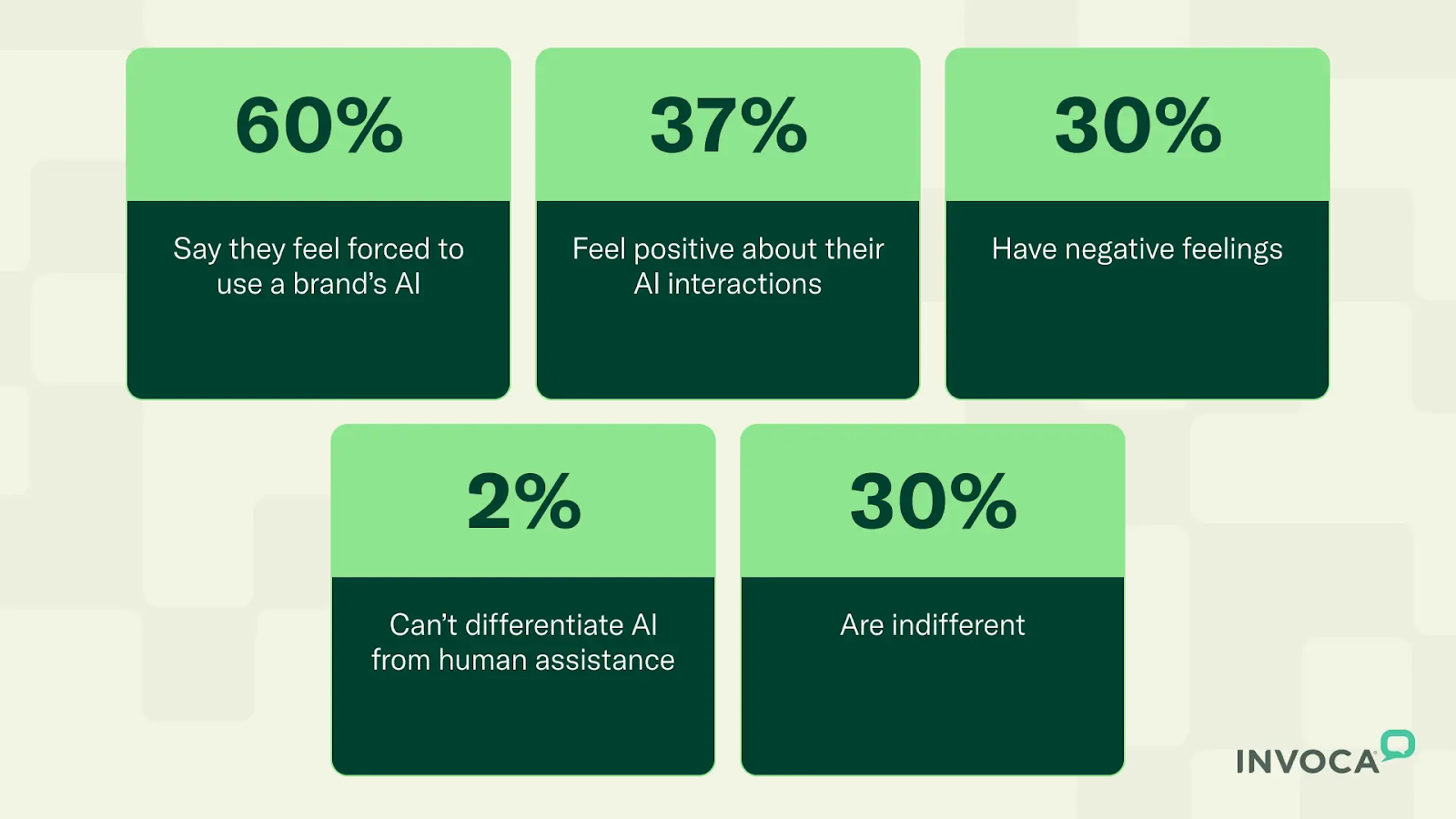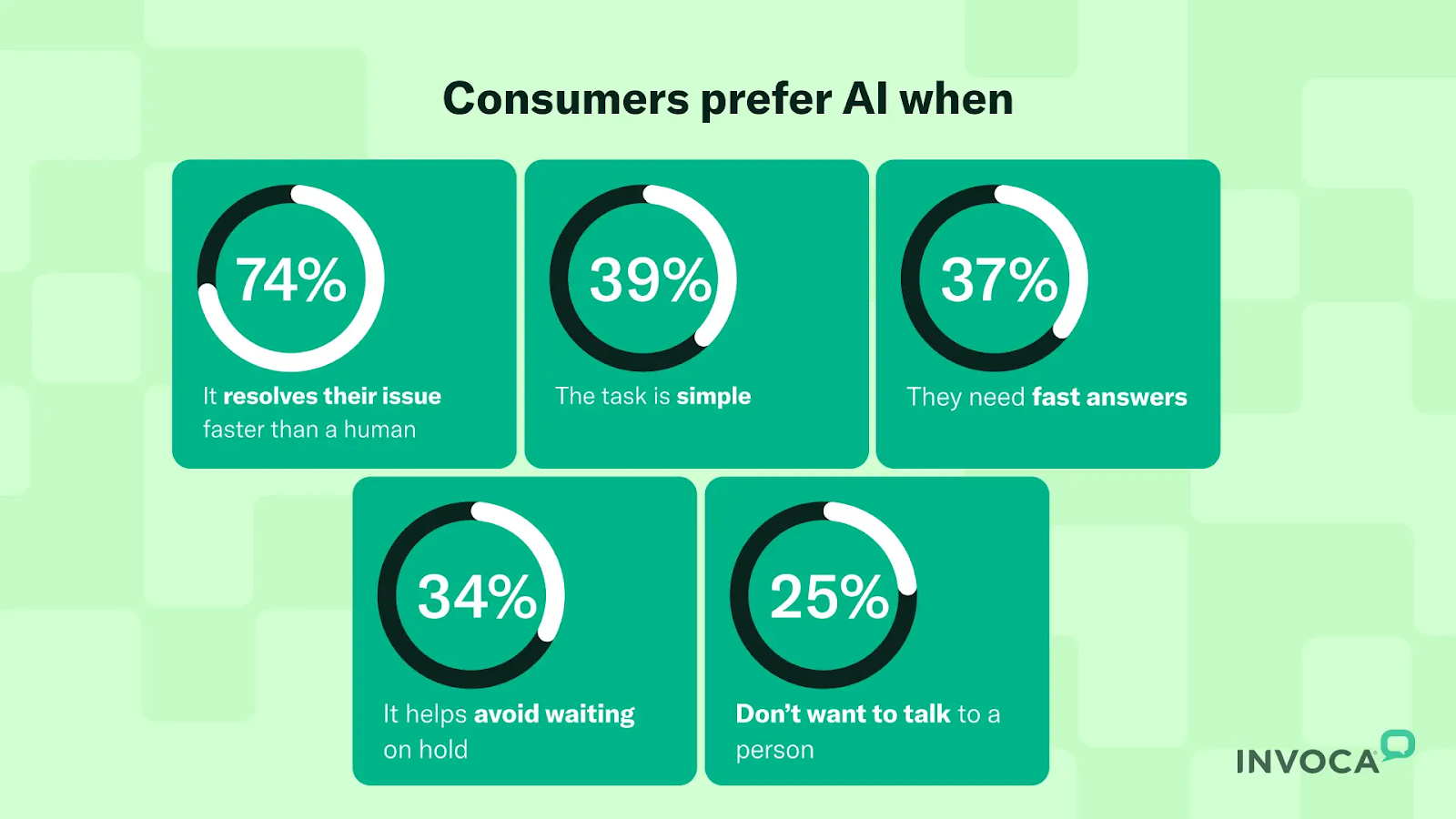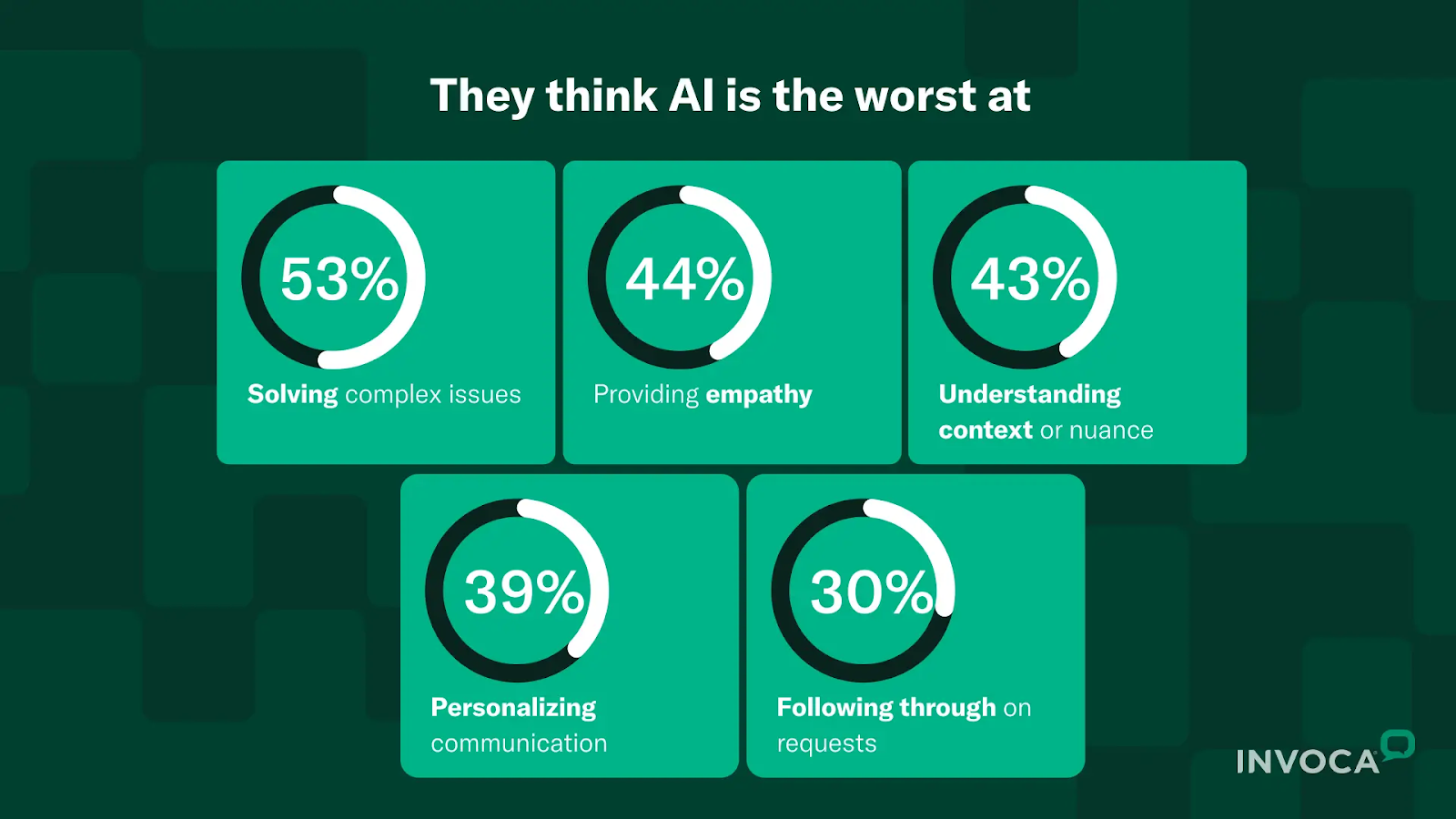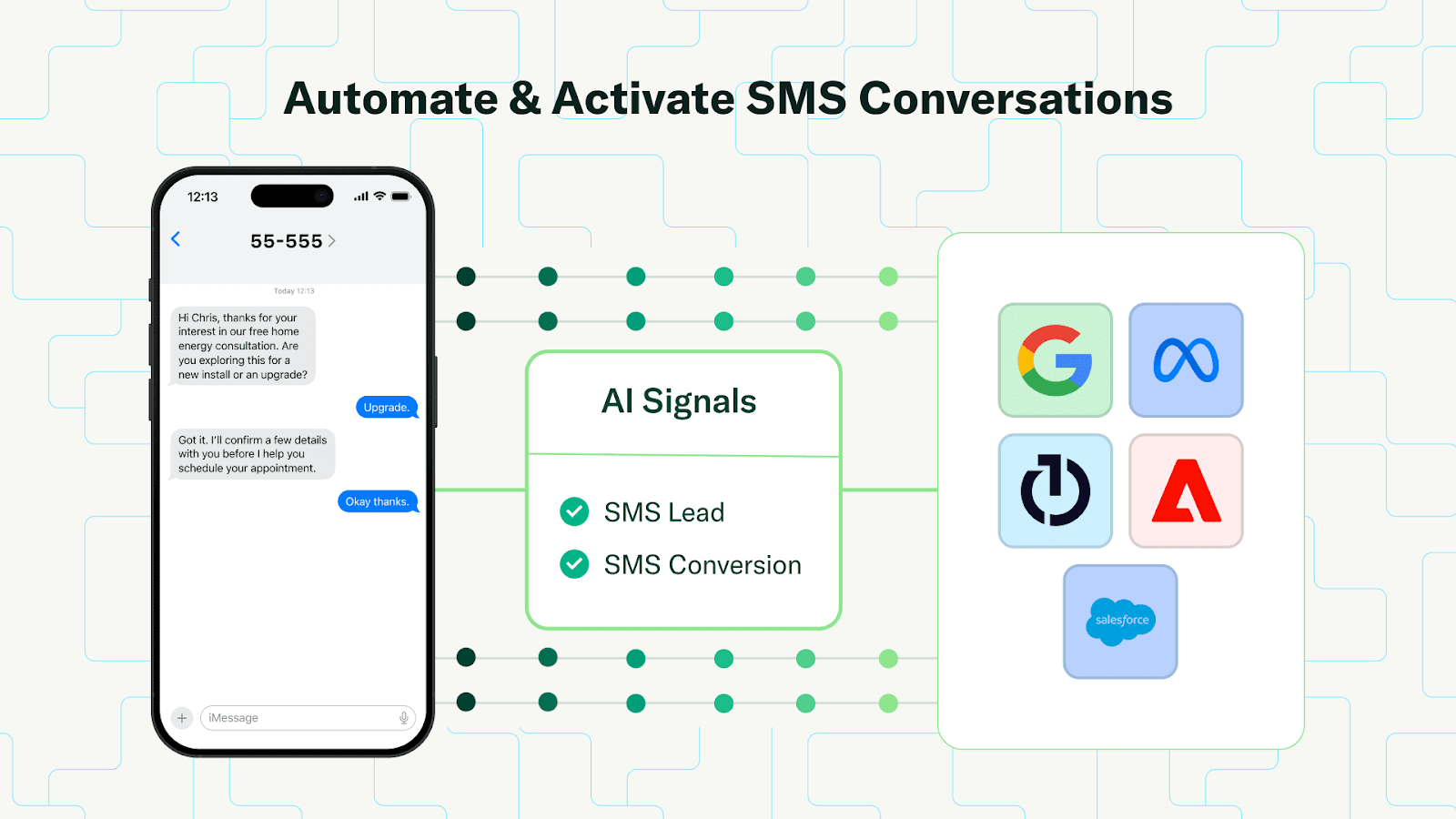When it comes to AI in customer service, the debate often feels polarised. On one side, you have enthusiastic advocates who believe AI will revolutionise customer experiences and unlock unprecedented efficiency. On the other hand, vocal critics argue that AI makes customers feel undervalued, signals a company's unwillingness to invest in real service, and represents a dystopian future where human connection disappears entirely.
But here's what most businesses miss: the real opportunity isn't in converting the zealots or placating the skeptics. According to our research, 30% of consumers are indifferent to companies' use of AI. They don't love it, they don't hate it, they simply want their problems solved efficiently, regardless of whether a human or AI does the solving.

These indifferent customers will determine whether your AI investments pay off or backfire. Win them over with seamless, helpful AI experiences, and you'll build loyalty and drive revenue growth. Frustrate them with clunky, tone-deaf automation, and you'll push them straight into your competitors' arms — and possibly into the "AI skeptic" camp permanently.
In this blog, we'll explore what makes AI experiences feel helpful versus frustrating, share data on what customers actually want from AI interactions, and provide a framework for deploying AI that delights rather than disappoints. As you’ll see, AI isn’t an all-or-nothing proposition — the brands that provide the right mix of AI and the human touch will win in 2026 and beyond.
Our Research Found that 35% of Consumers Are Indifferent to AI
For our recent B2C Buyer Experience Report, we surveyed 1,000 consumers from the US and UK who researched and made a “high-stakes” purchase in the last 12 months. The data tells a revealing story: 84% of consumers interacted with a brand's AI when making a high-stakes purchase in the last year (with another 7% unsure whether they were talking to a bot or a human). So AI engagement is clearly widespread — but did customers actually appreciate it?
Here's where it gets interesting: 37% of respondents said AI improved their buying experience, while 30% said it made their experience worse. Surprisingly, a whopping 30% were indifferent!
That indifferent segment represents a huge opportunity for brands. These customers aren’t resistant to AI — they’re simply unconvinced. If companies can design more helpful, human, and personalised AI interactions, they have a real chance to turn that neutral cohort into advocates.

When Consumers Want to Use AI
It’s understandable that people are cautious about trusting AI with high-stakes purchases like buying a car, booking a luxury trip, or choosing an insurance plan. In those moments, they want the empathy and reassurance that only a human agent can provide. But there are plenty of situations where consumers actually prefer AI over human help.
Our survey found that 74% of respondents prefer AI when it resolves their issue faster than a human, and 39% prefer it for simple tasks. Quick, low-stakes actions like checking store hours, confirming inventory, or rescheduling a booking are perfect opportunities for automation to shine. In these moments, speed and convenience win — and AI delivers both.

When Consumers Prefer Human Assistance
The trouble starts when the conversation gets complicated. More than half of survey respondents (53%) said AI performs worst when problems become complex or require nuance. Another 44% said AI struggles performing tasks that require empathy, meaning emotionally charged or sensitive situations are still a no-go for bots. Customers might be fine chatting with AI for quick fixes, but when the stakes feel personal, they want a human who can listen, interpret tone, and respond with genuine care.
Just as importantly, people don’t want to feel trapped in a conversation with a bot. 77% of consumers said they’d be more willing to engage with AI if they knew they could reach a real person whenever they needed. That single detail — giving users a clear, easy escape hatch to a human — can make all the difference between frustration and trust.

The Right Mix of AI and Human Touch Is a Must
Finding the right balance between AI and human touch isn’t just a nice-to-have — it’s essential to delivering great customer experiences. AI can handle speed, scale, and consistency in ways humans can’t, automating repetitive tasks and ensuring customers get quick, accurate answers around the clock. However, when a conversation requires empathy, reassurance, or creativity, human agents need to step in to provide the nuance that no algorithm can replicate.
The most successful businesses treat AI and human service as partners, not competitors. They let AI handle simple inquiries so that human agents can step in for more complex tasks. That hybrid model creates a seamless customer journey that builds lasting customer loyalty.
How Invoca’s AI Helps Improve the Buying Journey
The difference between AI that frustrates customers and AI that delights them often comes down to one critical factor: Does it enhance human interactions or attempt to replace them? Invoca falls firmly in the former category, using AI to make conversations between customers and agents more productive, personalised, and valuable.
Reviewing the thousands of phone calls your business gets every day isn’t feasible or scalable — that’s where our platform comes in. Invoca analyses customer conversations at scale to uncover patterns, pain points, and opportunities that would be impossible to spot manually. For example, our sentiment analysis feature can identify how consumers feel about your brand, and how those feelings shift during conversations with your agents. These deep insights help businesses continuously improve their customer experience, agent coaching, and sales processes based on real customer conversations — not assumptions.
In addition, Invoca’s AI Messaging Agent gives buyers assistance the moment they need it — whether after a missed call, a stalled form fill, or a question that would otherwise halt their progress. Because the agent is trained on your brand’s call transcripts and enriched with journey data, it delivers responses that feel authentic and personalised, answering questions, qualifying needs, booking and managing appointments, and re-engaging buyers without forcing them to repeat information. This creates a smoother, more convenient path to purchase that reduces frustration and drop-off.

When 35% of consumers are indifferent to AI, winning them over means making their experience as stress-free and painless as possible — no matter how they choose to engage with you.
Download the Full Report for More Data
Want to see how consumers really feel about AI in the buying journey? Download the full B2B Buyer Experience Report.


